
The history of Peru spans 15 millennia, extending back through several stages of cultural development along the country's desert coastline and in the Andes mountains. Peru's coast was home to the Norte Chico civilization, the oldest civilization in the Americas and one of the six cradles of civilization in the world. When the Spanish arrived in the sixteenth century, Peru was the homeland of the highland Inca Empire, the largest and most advanced state in pre-Columbian America. After the conquest of the Incas, the Spanish Empire established a Viceroyalty with jurisdiction over most of its South American domains. Peru declared independence from Spain in 1821, but achieved independence only after the Battle of Ayacucho three years later.
Peruvian culture is the gradual blending of Amerindian cultures with European and Asian ethnic groups. The ethnic diversity and rugged geography of Peru allowed diverse traditions and customs to co-exist. Peruvian culture has been deeply influenced by Native culture, Spanish culture, and Asian culture. Other minor influences on their culture are Chinese, Japanese, and other European peoples.
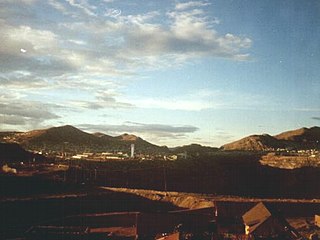
Cerro de Pasco is a city in central Peru, located at the top of the Andean Mountains. It is the capital of both the Pasco Province and the Department of Pasco, and an important mining center of silver, copper, zinc and lead. At an elevation of 4,330 metres (14,210 ft), it is one of the highest cities in the world, and with a population of 58,899, it is the highest or the second highest city with over 50,000 inhabitants. The elevation reaches up to 4,380 metres or 14,370 feet in the Yanacancha area. The city has a very intense cold climate and it is connected by road and by rail to the capital Lima, 300 kilometres or 190 miles away. Its urban area is formed by the districts of Chaupimarca, Yanacancha and Simón Bolívar.
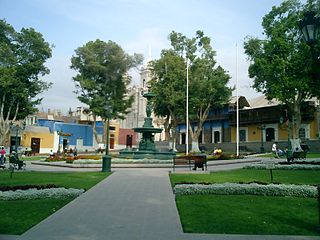
Moquegua is a city in southern Peru, located in the Department of Moquegua, of which it is the capital. It is also capital of Mariscal Nieto Province and Moquegua District. It is located 1144 kilometers south of the capital city of Lima.
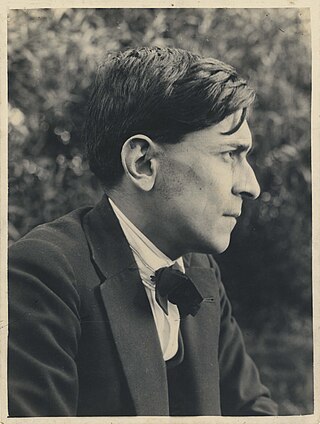
José Carlos Mariátegui La Chira was a Peruvian writer, sociologist, historian, journalist, politician, and Marxist philosopher.
The term Peruvian literature not only refers to literature produced in the independent Republic of Peru, but also to literature produced in the Viceroyalty of Peru during the country's colonial period, and to oral artistic forms created by diverse ethnic groups that existed in the area during the prehispanic period, such as the Quechua, the Aymara and the Chanka South American native groups.

Jose Manuel de los Reyes González de Prada y Ulloa was a Peruvian politician and anarchist, literary critic and director of the National Library of Peru. The first writer to criticize the oligarchy within Peru, he is well remembered as a social critic who helped develop Peruvian intellectual thought in the early twentieth century, as well as the academic style known as modernismo.
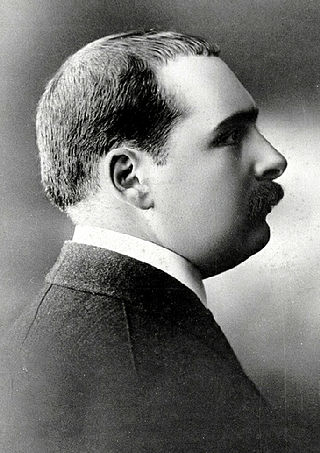
José de la Riva-Agüero y Osma, 6th Marquess of Montealegre de Aulestia and 5th of Casa-Dávila was a Peruvian lawyer, historian, writer, essayist and politician who served as Prime Minister of Peru, Minister of Justice and Mayor of Lima. He was a leading member of the so-called Generation of 900, a conservative ideological movement of the early 20th century that also included other important member of Peruvian society, such as Víctor Andrés Belaúnde, Francisco García Calderón Rey, Óscar Miró Quesada de la Guerra and José Gálvez Barrenechea.
José-Carlos Mariátegui is a scientist, writer, curator and scholar on culture, new media and technology. He explores the intersection of culture and technology, history of cybernetics, media archeology, digitization, video archives, and the impact of technology on memory institutions. Born in 1975, he is the son of Peruvian psychiatrist Javier Mariategui and the grandson of Jose Carlos Mariategui, the most influential Latin American Marxist thinker of the 20th century. He studied Mathematics and Biology at Cayetano Heredia University in Lima, Perú and did both Masters and Doctoral degrees in Information Systems and Innovation from the London School of Economics and Political Science – LSE (London). His PhD, dated 2013, was titled "Image, information and changing work practices: the case of the BBC’s Digital Media Initiative" under the supervision of Prof. Jannis Kallinikos. Has been involved in teaching and research activities, as well as published a variety of articles on art, science, technology, society and development. He founded Alta Tecnología Andina (ATA), non-profit organization dedicated to the development and research of artistic and scientific theories in Latin America. Founder of the International Festival of Video and Electronic Art in Lima (1998–2003). Founding Director of the José Carlos Mariátegui Museum, in Lima, Peru (1995-2005). He is currently an Adjunct Professor at LUISS (Rome), a Senior Visiting Research Fellow at the Department of Media and Communications at the LSE, a Board Member of Future Everything (UK), a Member of the Board of Trustees (Kuratorium) of the ZKM Center for Art and Media Karlsruhe (Germany) and Editorial Board member for the Leonardo Book Series at MIT Press. He also chairs the Museo de Arte de Lima - MALI Education Committee.
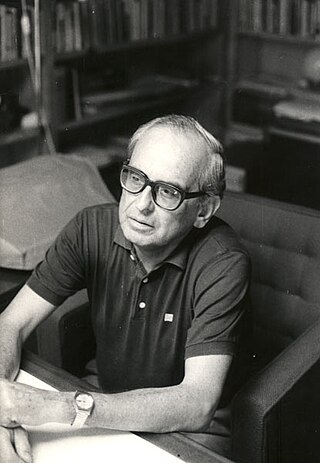
Javier Mariátegui Chiappe was a renowned Peruvian intellectual and psychiatrist. He was the last of the children of José Carlos Mariátegui and Anna Chiappe. Studied at the University of San Marcos where he also started teaching; he was also a founder of Cayetano Heredia University. He was also the founding director of the National Institute of Mental Health “Honorio Delgado - Hideyo Noguchi”. He died in Lima.

The pacha is an Andean cosmological concept associating the physical world and space with time, and corresponding with the concept of space-time.
Charles "Chuck" Walker is a professor of Latin American history at University of California, Davis. He is the director of its Hemispheric Institute on the Americas and director of Global Centers for Latin America & The Caribbean. From 2015–2020 he held the MacArthur Foundation Endowed Chair in International Human Rights. His interests include Peru, natural disasters, social movements, subaltern politics, truth commissions, and sports and empire.

Héctor Béjar Rivera is a Peruvian author, university professor. He served as the minister of foreign affairs of Peru from 29 July 2021 until 17 August 2021.

Gonzalo Portocarrero was a Peruvian sociologist, social scientist and essayist.

Luis Eduardo Valcárcel Vizcarra was a Peruvian historian, anthropologist, writer and activist. He was a researcher of pre-Hispanic Peru and one of the protagonists of the Indigenismo movement. He is considered the father of Peruvian anthropology, and his work focused on two fundamental axes: the revaluation of the Inca Empire and the vindication of the Andean culture. He brought awareness to the continuity that links the peasant of the Andes with the man of the Tahuantinsuyu.

Teodomiro A. Gutiérrez Cuevas, also known by his pseudonym Rumi Maqui, was a Peruvian Army Major and Indigenous leader who led a rebellion in Puno in 1915. After his imprisonment, he escaped his prison in Arequipa in January 1917.

Luis Alberto Flores Medina was a Peruvian lawyer, politician and diplomat. He was the Supreme Chief of the Revolutionary Union, a fascist party modelled after its italian counterpart, after the assassination of the party's founder, Luis Miguel Sánchez Cerro. He also served as a deputy for Lima and as Senator for Piura and Minister of Navy and Aviation, Government and Police and President of the Council of Ministers of Peru.

Taulichusco, also called the Elder, was an Incan kuraka who administered part of the Rímac Valley in the mid-16th century. The Stone of Taulichusco monument in his memory lies at the Pasaje Santa Rosa, next to the Plaza Mayor.













